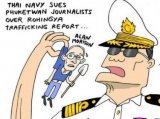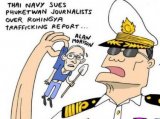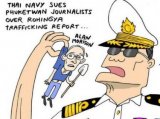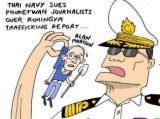PHUKET: British journalist Andrew Drummond has exposed killers, pedophiles and rip-off merchants of all kinds in a decades-long career as a foreign correspondent in Asia.
Notorious pop star Gary Glitter, with his liking for underage girls, is among the characters he has chased out of South-East Asia.
But in trying to warn readers about expat villains and scammers, Drummond has become a victim of bad laws in Thailand that can be wielded by fraudsters and crooks to lame a dogged pursuer and escape punishment.
Drummond said in a recent post on his popular online site that he is ''probably the most sued journalist in the world.'' And that is, he writes, ''because foreign crooks have been abusing Thailand's ill-conceived libel and Computer Crime Act laws.''
The same laws now being used by the Royal Thai Navy to silence Phuketwan journalists from writing about Rohingya boatpeople have already been used repeatedly by expats in the Thai sin city of Pattaya to stop Drummond exposing their activities.
One of about 20 cases involves a former Melbourne brothel owner who has sued because a commenter on Drummond's site described him as a ''pimp.''
Drummond's near-daily reports on the unsavory characters of Pattaya attract thousands of regular readers to andrew-drummond.com.
But the problem is that Thailand tends to be a country where becoming ''part of a community'' can provide fraudsters and extortionists with protection.
Only with the Royal Thai Navy's landmark prosecution of Phuketwan have international NGOs spoken out and Thai authorities begun to realise just how the country's criminal defamation laws and its Computer Crimes Act can be misused.
''It's a crooks charter for foreigners, and Thai authorities have been slow to realise it,'' Drummond said.
Foreign fraudsters find it easy to set themselves up in Thailand then use the influence of their local chums to ward off problems.
Drummond, though, has been dogged in pursuit of a handful of characters. Once, he would have been rewarded by seeing these people arrested and deported.
Instead, by using the law to work in their favor, a group of disreputable Pattaya-based businesspeople has tied up Drummond's time, energy and especially money with a string of unjust law suits.
Reports on Drummond's site of his clashes with this array of B-grade ne'er-do-wells from America, Europe and Australia entertain readers but have so far failed to awaken authorities to the damage being done to Thailand's reputation.
''These people shouldn't be in Thailand,'' Drummond said today. ''God knows how they get work permits.
''Their companies are all phoney. Thailand is a welcoming place for criminals, to be honest.''
Thanks to Drummond, the names of the villains are becoming well-known. But until Thai authorities react, they and others will continue to tarnish Thailand's reputation.
And once a good organisation like the Royal Thai Navy begins to use bad laws to restrict legitimate reporting, it's time for the country's lawmakers to wake up.
''It's all a bit ridiculous,'' said Drummond, who fights on thanks to the financial support coming directly from his readers. Crowd sourcing is likely to be essential to the future of investigative journalism.
Drummond has found that Britain's national newspapers, once his main source of income, are crying poor more often these days as digital reality bites hard.
And he has had to turn down seven overseas assignments because one court thought he might be ''a flight risk, although they neglected to tell me.''
''Thailand took British criminal law and tore it apart,'' said Drummond. ''There is no case law so rulings are up to individual judges, and you can't criticise judges in Thailand.''
Drummond isn't giving up without a fight but at 62 and with three young children who need a good education, he's looking longingly towards Britain.
Drummond is simply irreplaceable. If he is forced to leave Thailand, the crooks will be free to continue their shakedowns and rip-offs, without scrutiny.
Time is running out for the authorities to save the country's reputation. Repealing the bad laws would be a good start.
THE THAI LIBEL GAME EXPLAINED
By Andrew Drummond
UNLIKE IN THE developed world, libel in Thailand can be charged as a criminal offence. Anybody with money can make a complaint. When the case first goes to court the defendant is not allowed to speak up for himself.
Only his lawyer can ask questions, but he cannot produce witnesses.
In this way many of these cases are accepted. In Thailand there is no presumption of innocence. Thailand also has the Computer Crime Act, which was created for national security, but is now also being used to control journalists. So if stories are also on the internet the plaintiff will bring a double charge.
That means in each case the defendant will have to pay 100,000 baht bail, innocent or otherwise. The plaintiff can also ask that the court bar the defendant from leaving the country. This has happened to me in a case in which I was found not guilty . . . but it took nine months to hear!
Now all the plaintiff need to do is bring several cases to break the defendant financially. If they keep delaying the cases they can double the defendants legal fees, and they can also take charges out in a distant court. (Two plaintiffs have now moved to Samui). They can also keep requesting I do not leave the country.
None of the cases outstanding against me are serious and one case has actually been accepted in the Pattaya Court based only on a picture (none of the words of the story were translated or complained about by the plaintiff).
Two of the plaintiffs who have taken charges out against me are in the criminal and civil courts accused of massive rip-offs to the tune of hundreds of thousands of dollars. So they may well have the cash. Thus the only way to stop them is survive and fight or go to jail.


































Protect the Criminals because the Criminals are the ones in charge.
Sounds exactly like the western worlds banking system.
Injustice for all, and justice for none. (unless you are rich)
Posted by Tbs on April 7, 2014 14:58